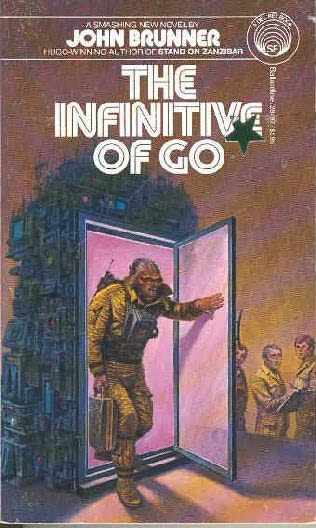At his very best, John Brunner was brilliant. He wrote an awful lot, and I find even his minor works repay re-reading. But there are a lot of them, so I don’t re-read any but my favourites very often.
As I was reading The Infinitive of Go, I found myself thinking that they don’t write books like that any more, or if they do I’m not reading them. I was surprised that it was first published as late as 1980—I knew I’d first read it in 1980, but in 1980 I was still catching up on fifty years of science fiction. The Infinitive of Go is set in a near future (of 1980, the Cold War is still going strong) in which there is a secret US research project that’s working on teleportation. Teleporting inanimate objects works perfectly, human tests teleporting across campus seem to be fine, but the first time they teleport someone to Russia he demands a countersign, then shoots himself and destroys the equipment. It soon becomes apparent to the inventor, Justin, that something is wrong. Government paranoia closes in, but after Justin himself teleports home from Russia to test the equipment things seem to have relaxed… and it turns out he’s in a different and nicer version of the world, surrounded by slightly nicer versions of his colleagues and patrons. Further experiments show that the supposed teleporter actually sends people into, and collects people from, different worlds.
The book is only 154 pages long—British Methuen edition pagecount. These days a three hundred page book is considered short. The story is centered around an invention and the implications of that invention for the characters, the world and the wider universe—and that’s pretty much all that’s in it. The characters only have enough personality so that you can tell they’re slightly different versions of themselves. The world only has enough detail (men haven’t worn ties for decades, women sometimes do but never with shirts) so that you can tell the different versions apart. The same goes for the romance plot, and the millionaire who is saved (in one world) from being evil by being gay, is pretty much the only character to get any psychological realism at all, and he only gets about a paragraph. The explanation and climax arise directly out of the main plot. This is the opposite of being paid by the word, this is like a haiku. If it had been written now it would have been a big fat book and the plot skeleton would have been bulked out by worldbuilding (of all the different worlds) and subplots and deeper characterisation—and Brunner could do all those things when he wanted to, and sell fat books too, by 1980, so I wonder why he didn’t want to? I suspect this may have been an experiment in being spare.
If so, does it work? Yes. There’s nothing to distract from the story, and the story, such as it is, is well told. It’s a minor Brunner, but it’s intriguing, it has some lovely SF ideas, it does something quite different with the idea of alternate worlds. These days people seem to deal with them as ways of changing history, I haven’t seen anything for a long time that looks at infinite alternatives of the present moment and your life. This isn’t a great classic. I liked it as a minor Brunner in 1980, and I like it as a minor Brunner now. If you see it, pick it up, it won’t take you long to read.










